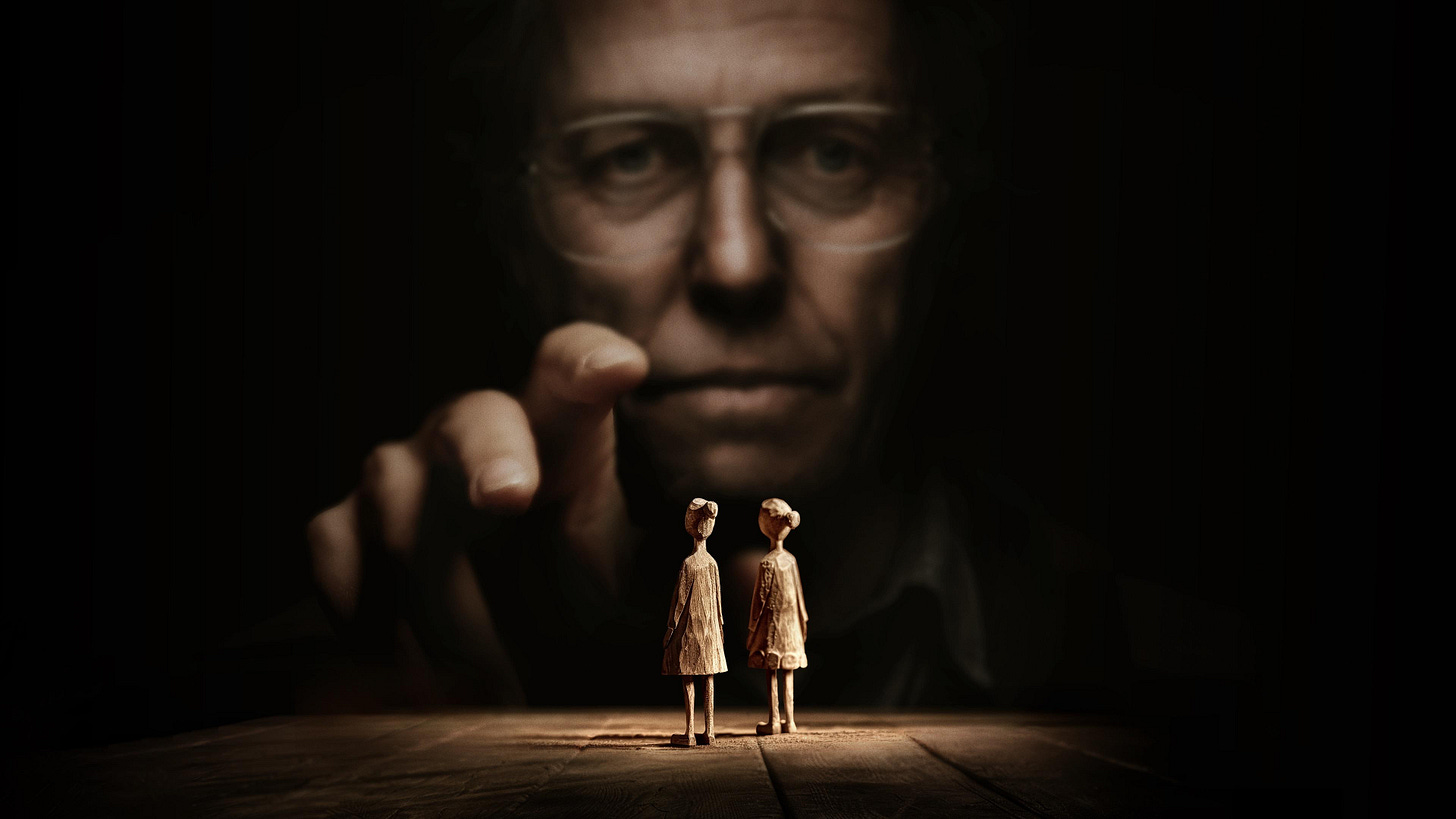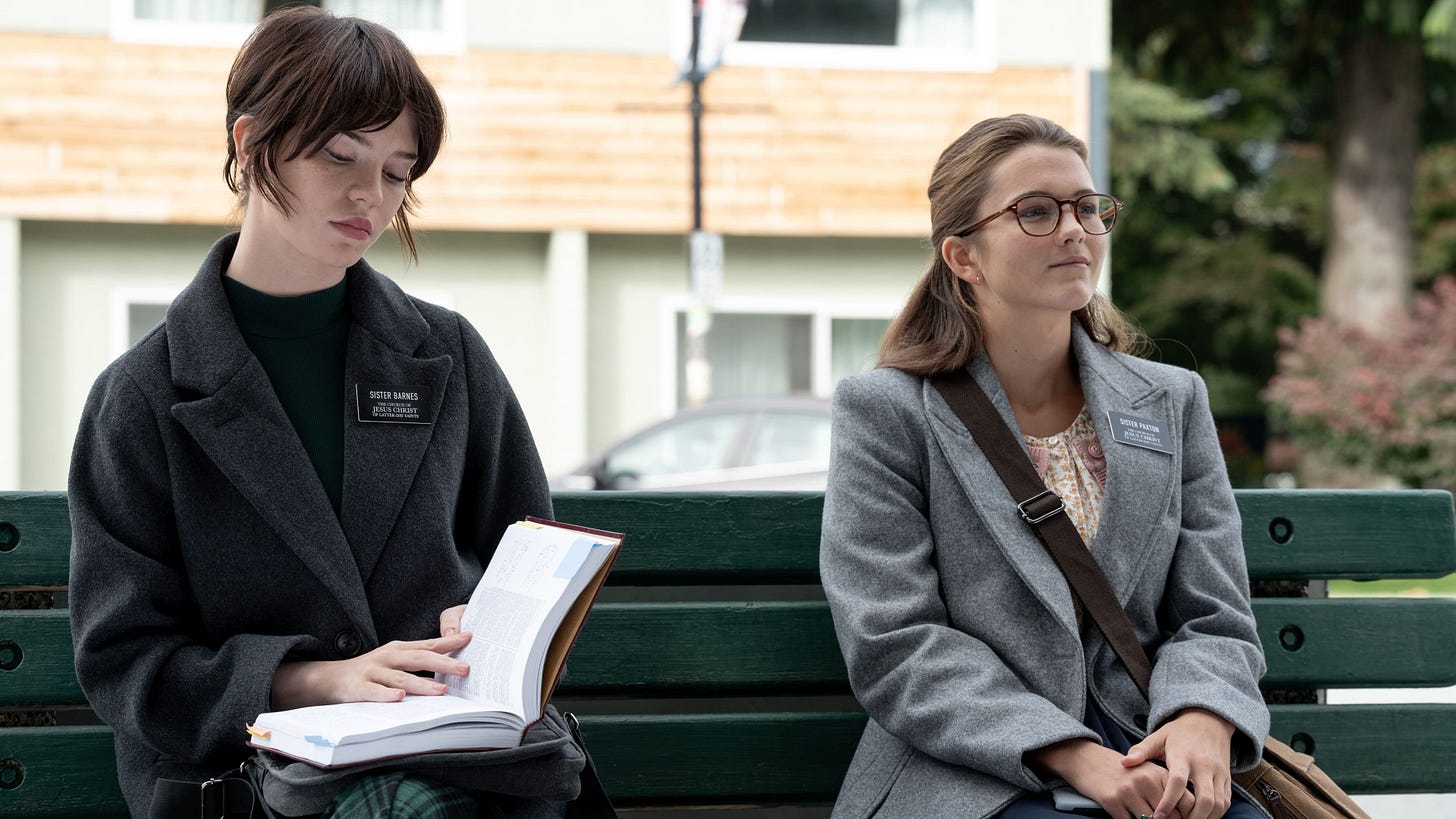HERETIC (2024) rewards your faith in Hugh Grant playing a horror movie villain to perfection, and that's about it
Scott Beck and Bryan Woods' theological thriller may have more ideas than it knows what to do with, but as an actors' showcase, it excels.
“I promise you, the last thing I wanted to do was find the one true religion… but unfortunately, I did.”
Speak No Evil meets Martyrs meets Barbarian meets Saw meets The Sunset Limited.
That’s almost what it feels like Heretic is trying to be, and on paper, the film threatens to be as interesting as that combination of thematically similar movies could (theoretically) alchemically add up to. Yet alas, Heretic doesn’t really hit as hard any of those other examples do individually, let alone collectively, because it feels like either its overall ambitions and intentions weren’t meant to be quite that lofty in the long run, or as though it chose to pull its punches from being truly as nihilistic, gruesome, confrontational, and deeply philosophically disturbing as some of those other films were, and as Hugh Grant’s character of Mr. Reed imagines himself to be.
If it weren’t for Hugh Grant being such an eminently captivating presence to watch as he relishes in playing such a sinister creep, and were it not for the equally excellent performances from Sophie Thatcher and Chloe East, then Heretic would be a complete letdown. It’s so tantalisingly close to being great - especially when Scott Beck and Bryan Woods’ directing and construction of scenes of suspense, in tandem with the anamorphic splendour of Chung Chung-hoon’s cinematography, are all on point - but the film is fundamentally undermined by Beck and Woods’ story ultimately not having the strength of its convictions, and feeling all the more lacklustre for it.
Heretic wants to make the same sort of point of Speak No Evil (either version, but let’s say the Danish original) about how much we allow things to be done to us before we recognise we’re being manipulated by evil - and even has its own variation (or should that be… iteration?) of the chilling “Because you let me” line - but it doesn’t really do much with it at all.
It wants to be like Martyrs, in having the antagonists use tactics of experimentation and exploitation of our young heroines as an exercise in exploring theological questions in an extremely unethical way, but even with its R rating / 15 certificate, Heretic doesn’t go there in anywhere near as graphic the ways that Martyrs did. It doesn’t really do much with it at all.
Beyond their shared inclusions of subterranean spaces beneath regular-seeming houses, Heretic wants to be like Barbarian (or, if you prefer the OG example, Psycho) in its subversiveness and surprising twists of plot that wrongfoot your expectations, but this comes at the expense of Heretic’s focus, tension, and consistency. Nothing embodies this more than Topher Grace’s waste of a character, who exists for no other reason than to have the audience know somebody is looking for Thatcher and East’s young missionaries during their ordeal with Grant’s performatively affable psycho. If you cut Grace out from the story entirely, nothing is affected.
This subversion-over-cohesion issue also later applies to when a character suddenly develops the deductive superpowers of a super-smart anime protagonist, or Sherlock Holmes (basically the same thing in Steven Moffat and Mark Gatiss’ take on the character), so as to make you rethink the assumptions of power dynamics you thought were in play. It feels like cleverness for the sake of cleverness, plot machinations overriding natural character development.
Heretic wants to be like Saw in positing Grant’s Mr. Reed as a villain mildly akin to Jigsaw - one who has a righteous purpose of putting people through life-threatening games that stress test their outlooks on life, and make the captive players see life through the same philosophical lens that the game-makers do. Unlike Jigsaw, however, Mr. Reed doesn’t use elaborately engineered traps to torture his victims (though his house is full of various clockwork timers and mechanisms that would make John Kramer proud), but instead uses his words, as he talks and talks and talks and talks at them with vacuous, disjointed, Reddit-atheist talking points ad nauseum to verbally bludgeon his victims into submission. That makes him a much more real villain, for sure, because people like him definitely exist - (Mr. Reed would get on great with Ricky Gervais and Richard Dawkins) - but I think he’d be scarier if his arguments cut deeper than his pseudo-intellectual monologues involving Monopoly and Lana Del Rey (no, I’m not making that up), and he said something disturbing-yet-true enough to warrant his assertion that what he has to say “will make you want to die”.
Perhaps if Mr. Reed was as vicious and cutting in his atheistic, pessimistic evaluation of existence as the character of White in Cormac McCarthy’s The Sunset Limited (played in the 2011 HBO TV movie adaptation by Tommy Lee Jones, opposite Samuel L. Jackson as Black), then Heretic would feel a little more worthwhile as a psychological horror thriller exploring the complexities and contradictions of faith.
But, to my chagrin, that’s not what Heretic is, and maybe that’s on me for expecting more from it than what I thought it was offering.
You’re better off reading either C.S. Lewis’ The Screwtape Letters (for a nuanced view of the pros of faith), Jeremy Runnells’ Letters To A CES Director (for a concise yet thorough disassembling of all the falsehoods the Church of Jesus Christ of Latter-Day Saints was built upon, which was highly enlightening for me as a former Mormon myself), or, if you want to really tread the deepest, darkest depths of pessimism that Heretic didn’t have the fortitude to confront or include, then try Thomas Ligotti’s The Conspiracy Against The Human Race (for an unsparing treatise on the dismantling of all notions of religion, optimism, and the inherent worth of consciousness and life itself, which I implore you NOT TO READ if you are ever in a bad headspace).
As for Heretic, it would be a mistake to expect any more from it than what it is: a decently well-made, definitely finely acted, and generally entertaining trashy popcorn thriller. Its laudable aspirations to thought-provoking insights on religion and faith don’t really stick the landing, so it’s best appreciated as an actors’ showcase for its lead trio of Sophie Thatcher, Chloe East, and of course, Hugh Grant making a great transition from his campy-fun villains in Paddington 2 and Dungeons & Dragons: Honour Among Thieves, to this campy-but-genuinely-menacing villain in Heretic, finally capitalising on his capacity for onscreen malevolence that his multiple roles in Cloud Atlas foreshadowed over a decade ago.








